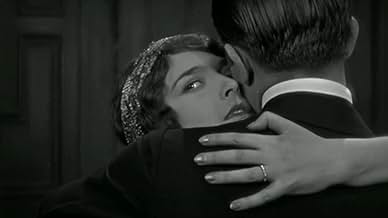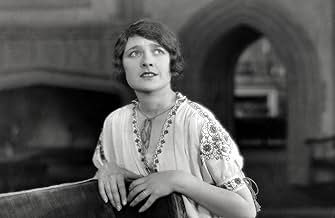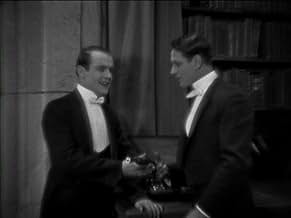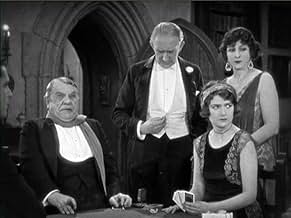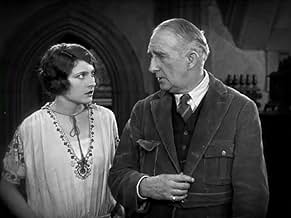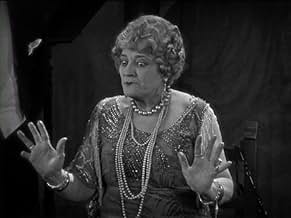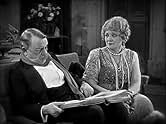Aggiungi una trama nella tua linguaAn unhappy woman considers leaving her dull husband for another man.An unhappy woman considers leaving her dull husband for another man.An unhappy woman considers leaving her dull husband for another man.
- Regia
- Sceneggiatura
- Star
Recensioni in evidenza
The Circle (1925)
** 1/2 (out of 4)
Frank Borzage's mix of comedy and drama has Elizabeth Cheney (Eleanor Boardman) wanting to leave her husband for her better lover but the woman knows that her husband's mother did the same thing to his father thirty years earlier. At a weekend party, the husband's mother, who he hasn't seen since she left, comes for a visit and is bringing the lover along as Elizabeth wants to see what would happen if she ran away. THE CIRCLE is something that I'm really not sure how to describe. I wouldn't call it a good movie but I think it has some fairly interesting aspects but it also had some downright weird moments. I'm really not sure what Borzage was trying for here unless he was just wanting to show that everything comes full circle. The first portion of the film is clearly a drama and things are going this direction throughout the majority of the movie but then it turns to a comedy when we're in current days. The mother's lover is a complete loud mouth who is constantly complaining about everything. This comedy attempt is the way the film says that it's best to stay who you're with but making an example out of this guy really served no purpose. Even stranger from the film is that his character is constantly cussing but in the intertitles they have certain letters marked out. Hell becomes "H--l" and damn becomes "D--m" and so on. The performances in the film are all over the place but Boardman is extremely good in the lead role and she does receive nice support from Malcolm McGregor and Alec Francis. George Fawcett appears as the obnoxious lover and we even seen a very young Joan Crawford playing the mother during the opening sequences. THE CIRCLE isn't going to appeal to everyone and it's mostly silent film buffs who will take the most from it.
** 1/2 (out of 4)
Frank Borzage's mix of comedy and drama has Elizabeth Cheney (Eleanor Boardman) wanting to leave her husband for her better lover but the woman knows that her husband's mother did the same thing to his father thirty years earlier. At a weekend party, the husband's mother, who he hasn't seen since she left, comes for a visit and is bringing the lover along as Elizabeth wants to see what would happen if she ran away. THE CIRCLE is something that I'm really not sure how to describe. I wouldn't call it a good movie but I think it has some fairly interesting aspects but it also had some downright weird moments. I'm really not sure what Borzage was trying for here unless he was just wanting to show that everything comes full circle. The first portion of the film is clearly a drama and things are going this direction throughout the majority of the movie but then it turns to a comedy when we're in current days. The mother's lover is a complete loud mouth who is constantly complaining about everything. This comedy attempt is the way the film says that it's best to stay who you're with but making an example out of this guy really served no purpose. Even stranger from the film is that his character is constantly cussing but in the intertitles they have certain letters marked out. Hell becomes "H--l" and damn becomes "D--m" and so on. The performances in the film are all over the place but Boardman is extremely good in the lead role and she does receive nice support from Malcolm McGregor and Alec Francis. George Fawcett appears as the obnoxious lover and we even seen a very young Joan Crawford playing the mother during the opening sequences. THE CIRCLE isn't going to appeal to everyone and it's mostly silent film buffs who will take the most from it.
A silent film which has a few nice moments, but mostly plods along under the listless direction of Frank Borzage. The premise comes courtesy a play from W. Somerset Maugham, and is about as contrived as it gets. A man endures his wife and friend running away together, leaving him to raise their son - and then thirty years later, his son finds himself possibly in the same position. As the son's girlfriend (Eleanor Boardman) is deciding whether to run off and leave him with another man (Malcolm McGregor), she arranges to have his mother and the man she left with show up at the family mansion so she can see how it worked out for them.
Eleanor Boardman is lovely, but she doesn't have a lot of chemistry with McGregor and the film lacks the spark of passion. It seemed to me that the most (innocently) sensual moment with her character came with her elderly father-in-law. I know it was a different time, but when her character sits on his lap, plays with his ear flirtatiously, and asks if she's "boney,", followed by him giving her a pat on the hip and reassuring her she's not, it seemed a little odd.
The cast also features an almost unrecognizable Joan Crawford in her very first year of filmmaking as the younger version of the old man's wife - the one who ran off with his friend. Look for her early on.
The test in the film really lies with the lovers who ran away thirty years ago, and there are many indications that their relationship hasn't age well - he's crotchety and cold, and she (Eugenie Besserer) doesn't seem to dress in an age appropriate way, at least for the morals of the period. Her son gets a glimpse of his mother's calf, bare except for a strand of jewelry, and is disturbed, for example, and she confesses to dying her hair to the young woman. The old couple bicker at each other and hardly seem like they could have been passionately in love once, but this is how relationships sometimes go. "Youth! It's just a day of spring...and gone!" she laments. Later when they take a trip down memory lane via an old photo album, however, they show a little affection for one another.
Curiously, the man who was jilted (Alec B. Francis) is completely at peace with these two, not showing a sign of hurt or betrayal, and in fact, laughing it up with them. This lack of feeling may have been an indication of stoicism and his own arrival at peace, but it also seemed consistent with the lack of emotional energy in the film. Instead we get attempts to liven things up in the intertitles with plenty of swear words with key letters dashed out, which, while amusing, was a poor substitute.
The younger woman takes violent jealousy as a sign of love in one of the moments leading up to the climax, which was unfortunate. The man she's thinking of running away with threatens that he would give her a black eye if someday some other man tried to take her away from him - note, not the other man, her. "You brute," she says, taking this as a sign of love (ugh!) before kissing him. In a clever way this rebounds on him, but by this time, the film had already seemed elongated, even though its runtime is just an hour. There's not enough here to recommend the film, unless you're a fan of one of the three women in the cast.
Eleanor Boardman is lovely, but she doesn't have a lot of chemistry with McGregor and the film lacks the spark of passion. It seemed to me that the most (innocently) sensual moment with her character came with her elderly father-in-law. I know it was a different time, but when her character sits on his lap, plays with his ear flirtatiously, and asks if she's "boney,", followed by him giving her a pat on the hip and reassuring her she's not, it seemed a little odd.
The cast also features an almost unrecognizable Joan Crawford in her very first year of filmmaking as the younger version of the old man's wife - the one who ran off with his friend. Look for her early on.
The test in the film really lies with the lovers who ran away thirty years ago, and there are many indications that their relationship hasn't age well - he's crotchety and cold, and she (Eugenie Besserer) doesn't seem to dress in an age appropriate way, at least for the morals of the period. Her son gets a glimpse of his mother's calf, bare except for a strand of jewelry, and is disturbed, for example, and she confesses to dying her hair to the young woman. The old couple bicker at each other and hardly seem like they could have been passionately in love once, but this is how relationships sometimes go. "Youth! It's just a day of spring...and gone!" she laments. Later when they take a trip down memory lane via an old photo album, however, they show a little affection for one another.
Curiously, the man who was jilted (Alec B. Francis) is completely at peace with these two, not showing a sign of hurt or betrayal, and in fact, laughing it up with them. This lack of feeling may have been an indication of stoicism and his own arrival at peace, but it also seemed consistent with the lack of emotional energy in the film. Instead we get attempts to liven things up in the intertitles with plenty of swear words with key letters dashed out, which, while amusing, was a poor substitute.
The younger woman takes violent jealousy as a sign of love in one of the moments leading up to the climax, which was unfortunate. The man she's thinking of running away with threatens that he would give her a black eye if someday some other man tried to take her away from him - note, not the other man, her. "You brute," she says, taking this as a sign of love (ugh!) before kissing him. In a clever way this rebounds on him, but by this time, the film had already seemed elongated, even though its runtime is just an hour. There's not enough here to recommend the film, unless you're a fan of one of the three women in the cast.
Shortly after, Lucille received more face time in the late September 1925 Frank Borzage-directed "The Circle." She's the young wife in the film's prologue who leaves her husband and son, Arnold, for a lover as the two scamper away on a horse and buggy. Fast forward thirty years. Arnold (Creighton Hale) has a wife (Eleanor Boardman) who faces a similar situation in that she's about to run away with her lover. Before she does, she wants to see how Arnold's mother and lover, now husband, are faring after all those years. She invites them over to the house, but unfortunately for Lucille, another older actress (Eugenie Besserer) takes her place in the reunion.
LeSuer's role in "The Circle" was uncredited. But the part was substantial enough that the MGM publicity head saw she had a future in film and definitely needed a new name: LeSuer sounded too similar to a sewer. A contest in the Movie Weekly publication to rename the actress resulted in the winning entry "Joan Arden." Since there was another movie actress, Joan Arden, the poll's second place surname was "Crawford." She detested that since it reminded her of sounding like a crawfish. But she bowed to MGM's wishes. Joan Crawford then went on a personal campaign to secure larger roles, winning several dance contests and hobnobbing with influential studio personnel.
LeSuer's role in "The Circle" was uncredited. But the part was substantial enough that the MGM publicity head saw she had a future in film and definitely needed a new name: LeSuer sounded too similar to a sewer. A contest in the Movie Weekly publication to rename the actress resulted in the winning entry "Joan Arden." Since there was another movie actress, Joan Arden, the poll's second place surname was "Crawford." She detested that since it reminded her of sounding like a crawfish. But she bowed to MGM's wishes. Joan Crawford then went on a personal campaign to secure larger roles, winning several dance contests and hobnobbing with influential studio personnel.
From director Frank Borzage, based on a play by W. Somerset Maugham. Eleanor Boardman stars as Elizabeth Cheney, recently married to Arnold (Creighton Hale) but secretly in love with the handsome Teddy (Malcolm McGregor), Arnold's best friend. Everyone is anxiously awaiting the arrival of guests: Arnold's mother Kitty (Eugenie Besserer) and her second husband Hughie (George Fawcett). The trouble is, Kitty ran away with Hughie years ago, leaving Arnold's father Clive (Alec B. Francis) devastated. How will everyone react when they're all together again, and will Elizabeth follow in the footsteps of Kitty and run away with the best man?
This would have been pretty stultifying even if there was sound, but without the dialogue to lean on, the film is a static exercise in facial expressions as people sit in one of two rooms. None of the performers stood out, and this is the third film I've watched McGregor in in a week's time, and he has yet to impress. Joan Crawford has one of her earliest roles as the young Kitty shown in flashback.
This would have been pretty stultifying even if there was sound, but without the dialogue to lean on, the film is a static exercise in facial expressions as people sit in one of two rooms. None of the performers stood out, and this is the third film I've watched McGregor in in a week's time, and he has yet to impress. Joan Crawford has one of her earliest roles as the young Kitty shown in flashback.
This is a very good silent film that tests out the old expression "Like father, like son".
When the film begins, Clive doesn't realize that his beloved wife, Catherine, is cheating on him. She unexpectedly runs away with Clive's best friend...leaving Clive and her young son to fend for themselves.
Thirty years pass. The son, Arnold, has married Elizabeth and while he doesn't realize it, trouble is brewing...similar to his parents. Elizabeth has invited Arnold's mother and step-father to their estate. But her reasons suck...she wants to find out how well things went for them following their affair. She has a romantic notion that the pair were deliriously happy...and she's contemplating running off with some young buckaroo herself. Fortunately, Clive is not supposed to be home during this meeting between mother and son--the first in 30 years. However, Clive DOES end up returning early and the reaction is NOT what everyone expected. He was very happy to see his wife and old friend...and harbors no bitterness! What about Arnold? Well, see the film and find out for yourself.
This is a very clever film that deals with adultery in a very grown up and realistic manner (at least in some ways). It also is very well written and acted...so if you think you'll hate silents, it's a good bet this one will keep you entertained.
When the film begins, Clive doesn't realize that his beloved wife, Catherine, is cheating on him. She unexpectedly runs away with Clive's best friend...leaving Clive and her young son to fend for themselves.
Thirty years pass. The son, Arnold, has married Elizabeth and while he doesn't realize it, trouble is brewing...similar to his parents. Elizabeth has invited Arnold's mother and step-father to their estate. But her reasons suck...she wants to find out how well things went for them following their affair. She has a romantic notion that the pair were deliriously happy...and she's contemplating running off with some young buckaroo herself. Fortunately, Clive is not supposed to be home during this meeting between mother and son--the first in 30 years. However, Clive DOES end up returning early and the reaction is NOT what everyone expected. He was very happy to see his wife and old friend...and harbors no bitterness! What about Arnold? Well, see the film and find out for yourself.
This is a very clever film that deals with adultery in a very grown up and realistic manner (at least in some ways). It also is very well written and acted...so if you think you'll hate silents, it's a good bet this one will keep you entertained.
Lo sapevi?
- QuizNotable as the first film to feature Joan Crawford billed under her newly-christened screen name, selected from the winning entry in a Photoplay magazine contest.
- Citazioni
Opening Title Card: IT is the intention to herein point out that old, yet so valuable, moral - - "MAN MAY SELECT A WIFE - BUT HE SHOULD BE CAREFUL WHOSE WIFE HE SELECTS!"
- ConnessioniVersion of Strictly Unconventional (1930)
I più visti
Accedi per valutare e creare un elenco di titoli salvati per ottenere consigli personalizzati
Dettagli
- Tempo di esecuzione1 ora 11 minuti
- Colore
- Mix di suoni
- Proporzioni
- 1.33 : 1
Contribuisci a questa pagina
Suggerisci una modifica o aggiungi i contenuti mancanti

Divario superiore
By what name was The Circle (1925) officially released in Canada in English?
Rispondi
